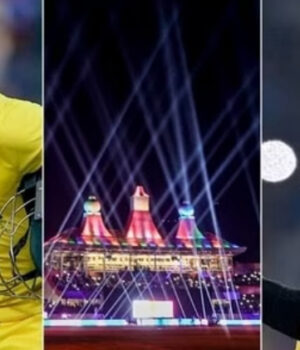In the aftermath of his record-breaking century against the Netherlands, Australian cricketer Glenn Maxwell, often hailed as ‘The Big Show’ for his aggressive batting style, recently made waves off the field by expressing his disapproval of the mid-match light show organized by the World Cup authorities during Australia’s resounding 309-run victory. The incident occurred in New Delhi’s Arun Jaitley stadium, where Maxwell’s explosive on-field performance was matched by an equally explosive critique.
Maxwell’s standout performance with the bat had already dominated headlines, but it was his vocal criticism of the unconventional two-minute light show that added another layer of intrigue to the story. The spectacle in question occurred while the Netherlands were in the midst of a daunting chase, trying to reach a substantial 400-run target set by the Australian team. The stadium’s transformation into what could only be described as a virtual nightclub, complete with flashing lights and pulsating beats, certainly caught everyone’s attention, but not necessarily in the way the organizers had hoped.
For Maxwell, the issue at hand wasn’t about the spectacle’s entertainment value but its timing and impact on the game. As someone who’s well-known for his fiery on-field persona and aggressive batting style, he is no stranger to making bold statements. This time, though, his passion was directed towards the in-game experience that left him less than thrilled.
Maxwell’s critique raises a series of important questions about the role of such mid-match entertainment in the world of cricket. The T20 format, which often incorporates innovations to enhance fan engagement, has seen various experiments aimed at turning cricket into a more dynamic and immersive experience. However, Maxwell’s comments underline the fine balance between creating an enjoyable atmosphere for spectators and ensuring that the core integrity of the game remains intact.
In the modern era of cricket, where every player’s performance is scrutinized under the spotlight, it’s crucial to recognize that cricketers have diverse opinions on these matters. While some may relish the entertainment quotient, others like Maxwell may view it as a potential distraction from the game’s purity.
The debate sparked by Maxwell’s comments reflects the ongoing evolution of cricket, as it strives to attract a broader and younger audience without alienating traditionalists who appreciate the sport’s intrinsic beauty. In this ongoing tug-of-war between tradition and innovation, players like Maxwell emerge as critical voices, reminding us that while cricket can evolve, it must do so without sacrificing the essence of the game that has captivated generations.
Glenn Maxwell’s critique of the mid-match light show is a testament to his unapologetic personality and his unwavering commitment to the sport. As cricket continues to adapt to the changing times, the verdict on such innovations remains open, with Maxwell’s vocal stance serving as a compelling reminder that, for some, the old adage “cricket is a gentleman’s game” still holds true.










